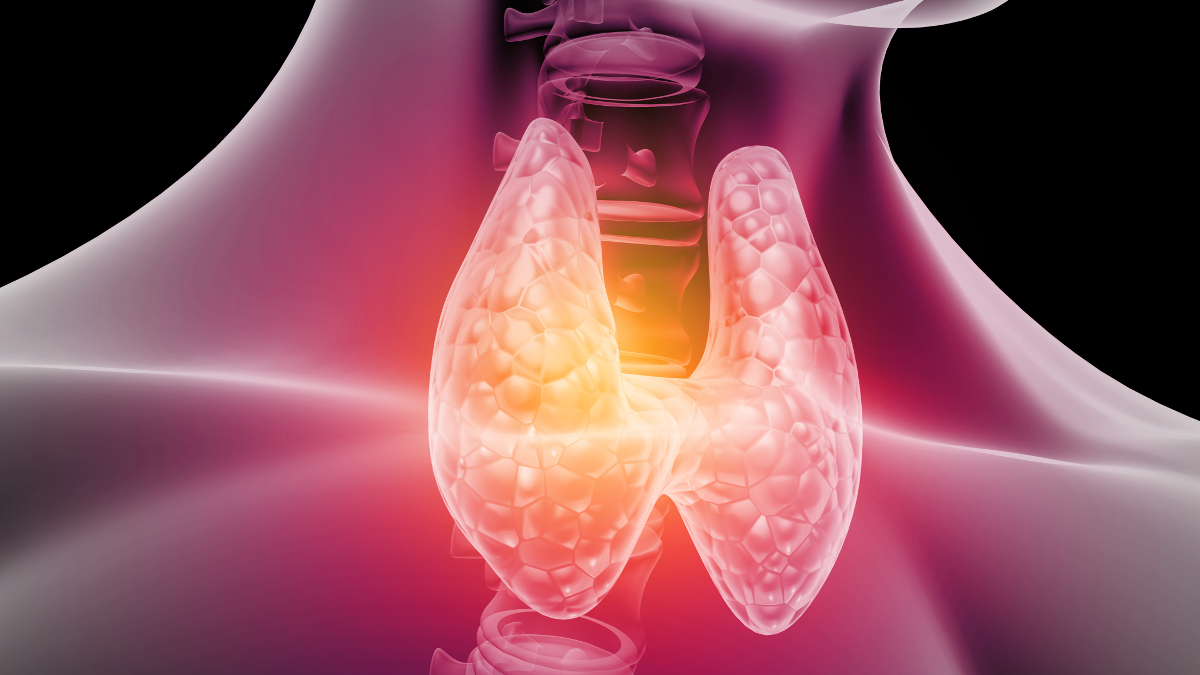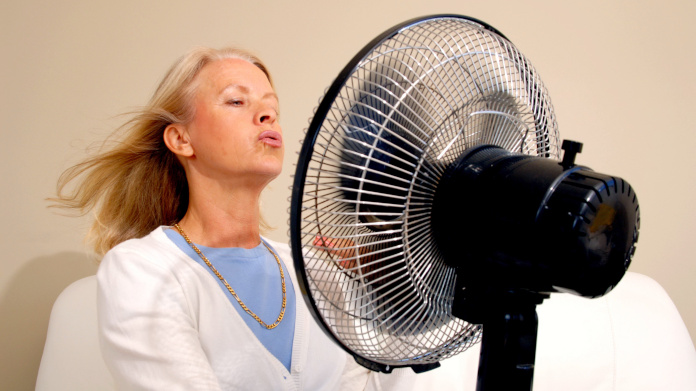4 natural products for taking care of your thyroid
Though very small, the thyroid gland plays a critical part in ensuring the body functions correctly, so it’s vitally important to look after it. Discover 4 natural compounds beneficial for the health of this key endocrine gland.

Review of the thyroid: a gland with a butterfly effect
A small gland – measuring less than 6cm and weighing around 30 grams – the thyroid is located at the base of the neck and has two lobes shaped like butterfly wings. Though unobtrusive, it plays a central role in the human body (1).
Like many other endocrine glands, thyroid function is controlled by the ‘master gland’, the small, bean-shaped organ situated at the base of the brain called the pituitary (2), which is itself controlled by the hypothalamus.
The hypothalamus produces thyrotropin-releasing hormone (TRH) which stimulates the pituitary to produce thyroid-stimulating hormone (TSH), which in turn stimulates the thyroid gland’s production of thyroid hormones: thyroxine (T4 or tetraiodothyronine) and triiodothyronine (T3).
And effectively, it is these two hormones that regulate the pace at which all our organs function. Thus the thyroid gland affects our metabolism, our weight, our mental health, our libido, our energy and fatigue levels, etc.
To a significant extent, therefore, our health and well-being rely on the ability of this tiny gland to produce precisely the right amount of hormones necessary for our organs to function at the correct rate. An ability which itself depends on another gland, which in turn depends on another gland ... The slightest ‘gremlin’ in this well-oiled machine and the whole system either gets over-excited – or falls asleep.
Thyroid problems: over-active or hibernating?
With the thyroid, it’s all a question of rhythm. And because of this, the slightest problem with it disrupts our bodies’ overall rhythm.
-
too many thyroid hormones circulating? Your heart starts racing, as does your gut, and your metabolism, you lose weight even though your appetite has increased, you have problems sleeping, you become anxious, etc. (3)
-
too few thyroid hormones? Different - or sometimes similar - problems occur: weight gain, chronic fatigue, low mood or even depression, etc. (4)
Women are particularly affected by one or other of these thyroid problems, especially after the age of 60, though pregnant women, new mothers, or women going through the menopause can all be impacted. Worldwide, more than 200 million people are thought to suffer from thyroid issues.
Avoid plastics to protect your thyroid
And if such problems are growing year on year, one of the reasons is likely to be endocrine disruptors.
These chemicals are, in the main, synthetic molecules used in the manufacture of products with specific characteristics, which successfully ‘trick’ our endocrine glands because they have a similar form to that of molecules found naturally in the body (5). They are thus able to either inhibit or maximise the functioning of our endocrine glands, including one of the most important – the thyroid.
Endocrine disruptors are now the subject of extensive investigation. In France for example, Inserm (the National Institute of Health and Medical Research) (6) and Anses (the Agency for Food, Environmental and Occupational Health & Safety) (7) are conducting a number of studies to identify endocrine disruptors, analyze their mechanisms of action and find ways of preventing them in the future.
Thus it’s a good idea toto avoid plastics in general (found in certain food containers, cosmetics, toys …) in order to protect against the potentially thyroid-damaging effects of known or suspected endocrine disruptors (8).
Benefits of iodine
Iodine is the primary component used to produce thyroid hormones, as we can see from the names of these hormones: tetra-iodo-thyronine and tri-iodo-thyronine.
Specifically, ingested iodine circulating in the body passes from blood vessels to vesicles that make up the thyroid which then uses the iodineto produce hormones. When thyroid hormones are used, part of this constituent iodine is released back into the body and it can then be recycled by the thyroid. (9)
While widespread encouragement of iodised salt consumption has significantly reduced potential iodine deficiency in much of Europe, it has not completely eradicated the problem. Thus, with the WHO estimating that a billion people globally are deficient in iodine, one would expect around 200 million people to be suffering with goitres and 6 million with cretinism. And this includes European populations. (10)
Furthermore, salt-free diets, living far from the sea, and low consumption of seafood (fish, shellfish, seaweed – not spirulina - etc) are also risk factors for iodine deficiency.
Which is why, in cases of suspected iodine deficiency, and on medical advice, some people choose to supplement with iodine as a natural way of protecting their thyroid (with, for example, Natural Iodine, a source of iodine extracted from kelp).
Iodine supplementation is not, however, recommended for pregnant women or those who are hypersensitive to iodine. To avoid potential interactions, you should also take medical advice before supplementing with iodine if you are taking any medication.
Kelp, an invaluable aid to thyroid health
Kelp is a type of algae rich in iodine and alginate. Numerous studies have shown that consuming kelp supports normal thyroid function and hormone production as well as normal energy metabolism (11).
Benefits of a resin called guggul
Used for thousands of years in Ayurveda, the resin guggul is rich in specific active ingredients called guggulsterones (12), which act at various levels in the body. Here again, research has shown guggul to support thyroid health (13).
Selenium and thyroid hormones
Selenium has a regulating effect on thyroid hormones, particularly triiodothyronine (T3) (14). In fact it’s in the thyroid, where specific selenoproteins are found, that selenium is primarily concentrated. This trace-element plays an active part in maintaining normal thyroid function (15).
Thus selenium is another natural substance that can help you take care of your thyroid. It’s best to take selenium, the most bioavailable form of the compound (Selenium).
A synergistic formulation rich in iodine, guggul, selenium ...
To benefit from these various natural substances ‘in one go’, you can opt for a specific synergistic formulation (such as Natural Thyro Formula, rich in kelp-sourced iodine, guggul, selenium, and kaempferol, as well as other minerals and micronutrients). Note, however, that as this supplement is comprehensive, it should not be taken alongside other supplements for the thyroid.
References
- STATHATOS, Nikolaos. Thyroid physiology. Medical Clinics, 2012, vol. 96, no 2, p. 165-173.
- TAUBENHAUS, M., AMROMIN, G. D., et al. The effects of the hypophysis, thyroid, sex steroids, and the adrenal cortex upon granulation tissue. Journal of Laboratory and Clinical Medicine, 1950, vol. 36, p. 7-18.
- REID, Jeri R. et WHEELER, Stephen F. Hyperthyroidism: diagnosis and treatment. American family physician, 2005, vol. 72, no 4, p. 623-630.
- GAITONDE, David Y., ROWLEY, Kevin D., et SWEENEY, Lori B. Hypothyroidism: an update. South African Family Practice, 2012, vol. 54, no 5, p. 384-390.
- MULTIGNER, Luc et KADHEL, Philippe. Perturbateurs endocriniens, concepts et réalité. Archives des Maladies Professionnelles et de l'Environnement, 2008, vol. 69, no 5-6, p. 710-717.
- https://www.inserm.fr/information-en-sante/dossiers-information/perturbateurs-endocriniens
- https://www.anses.fr/fr/content/les-perturbateurs-endocriniens
- BRUCKER-DAVIS, Françoise, HIÉRONIMUS, Sylvie, et FÉNICHEL, Patrick. Thyroïde et environnement. La Presse Médicale, 2016, vol. 45, no 1, p. 78-87.
- SPITZWEG, Christine, HEUFELDER, Armin E., et MORRIS, John C. Thyroid iodine transport. Thyroid, 2000, vol. 10, no 4, p. 321-330.
- ZIMMERMANN, Michael B. et BOELAERT, Kristien. Iodine deficiency and thyroid disorders. The Lancet Diabetes & Endocrinology, 2015, vol. 3, no 4, p. 286-295.
- REZK, R. G. et ABD EL-AZIME, A. Sh. Fucus vesiculosus Ameliorates Histological and Biochemical Changes in Thyroid Gland and Ovary of Irradiated Rats. Arab Journal of Nuclear Science and Applications, 2013, vol. 46, no 3, p. 286-296.
- SHAH, Rohan, GULATI, Vandana, et PALOMBO, Enzo A. Pharmacological properties of guggulsterones, the major active components of gum guggul. Phytotherapy research, 2012, vol. 26, no 11, p. 1594-1605.
- STANSBURY, Jill, SAUNDERS, Paul, et WINSTON, David. Promoting healthy thyroid function with iodine, bladderwrack, guggul and iris. Journal of Restorative Medicine, 2012, vol. 1, no 1, p. 83-90.
- KÖHRLE, Josef et GÄRTNER, Roland. Selenium and thyroid. Best Practice & Research Clinical Endocrinology & Metabolism, 2009, vol. 23, no 6, p. 815-827.
- KOHRLE, J., JAKOB, F., CONTEMPRÉ, Bernard, et al. Selenium, the thyroid, and the endocrine system. Endocrine reviews, 2005, vol. 26, no 7, p. 944-984.
Keywords
3 Days
repeat customer
recommended by my doctor. easy to create an account. Discounts and specials are appreciated. packaging and delivery is dependable. Capsules easy to digest. I've had some some capsules and tablets that are broken inside their bottles.
Kokee
8 Days
Order was shipped on time and packaged…Wonderful Jobs!
Order was shipped on time and packaged excellently.
DMHoge
14 Days
great products and prices
great products and prices
Marie
20 Days
Easy to navigate site
Easy to navigate site, had what I was searching for, good price. easy order-check out
James Tucker
26 Days
My skin is clearing up nicely!
Pretty good for my skin so far.
Christian
28 Days
The new packaging is excellent
The new packaging is excellent - finally! No more squashed boxes and torn envelopes.
GORAN
29 Days
Great Product
Great Product
Larry Garrett
33 Days
Quick shipping
Quick shipping; good price. No issues!
Mary McCarty
35 Days
Thr product is very good and is helping…
Thr product is very good and is helping me on my health. Then is always on time
LUGO Luz
37 Days
Buying was fine
Buying was fine. I had problems with the website not recognizing my login info, and had to call to get it fixed. Other than that, everything was good.
David S. Clark
38 Days
Your super maca and super ginseng are…phenomenal
Your super maca and super ginseng are phenomenal supplements that compliment each other when taking them together. Fantastic feeling of well-being and lots of mid day energy without the crash.
Keith Mason
40 Days
I have had amazing results with every…
I have had amazing results with every supplement I've purchased. I am extremely satisfied with this company
kirstin Torres
40 Days
Fine products
Fine products . They are on the leading edge of online supplements. The only issue -so far-is they sometime run out of subscription items.
Jason Argos
43 Days
The ordering process is very user…
The ordering process is very user friendly and the products always come in a timely manner.
CARTER Rhonda
44 Days
The price for Dr
The price for Dr. Pero's AC-11 is reasonable and in line with his views. (my former colleague). Keep it pure.
CAMPBELL Clayton




